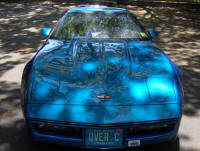RIKLBLOG
|
| Tomorrow |
| 28 March 2009 |
| Yesterday |
| Index |
| Eventide |
| SETI League |
| PriUPS Project |
| Bonus! |
| Contact |


Crimebutton(TM) Thoughtex
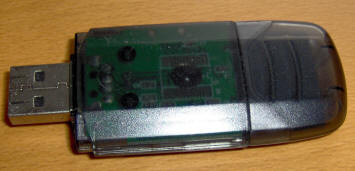 |
This is an 8 Gigabyte memory stick. Like most computer
stuff nowadays, it's close to "free." In fact this one was
actually free, since it came as an accessory to the memory card
adapter at the right. But wait! There's less! |
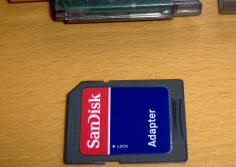 |
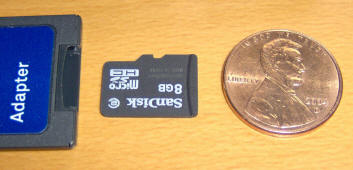 |
The whole point of the adapter is to provide a space to plug
in the actual memory card, the tiny chip next to the penny.
That's 8 Gigabytes on a card about the size of a USB plug and
not nearly as thick. But wait! There's less! |
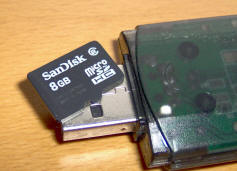 |
Why, you might ask, do I have an 8GB data card available to photograph? And how did I get it for "free" or, for that matter, for free? Simple! It came with and installed in my BlackBerry Storm cellphone. It is no longer there because I just replaced it with a 16GB data card. Same small outline, same slender shape. Did I mention: 16 Gigabytes?
How Much is 16 Gigabytes?
Bytes used to be a dollar each. I know that because my very first computer, the Hewlett-Packard 9810A, had an optional 1K memory card for $1000. That was in 1970. If bytes were still a dollar each, two of these 16GB cards could just about be purchased by the wealth of one or two of our richest citizens, and perhaps the United States government could afford to give a microscopic sliver of one to each citizen as part of a bailout package. (Of course, in those days, a dollar was worth almost fifty cents, and no individual had so many billions of them.) But memory prices are about as deflationary as things get. Cards like these are now given away as tradeshow swag.
Digression aside, 16 Gigabytes is enough to store MP3s of about 300 CDs, or tens of thousands of photographs, or several DVD movies, or everything that you happen to hear for a couple of weeks. By making reasonable assumptions, it's also enough to record everything you see for a few days as well. In other words, it can hold your memory, at least as far as seeing and hearing are concerned.
Would You Pay $110 To Save a Year of Your Life?
That's an easy one! I would. And, not so long from now, I probably will, although by then it might be $110 for two or three years. How so? Follow along with my thought experiment/invention. (Gedanken is too fancy for this blogitem.) I didn't break out the triple-beam balance to weigh the memory card, but it's probably about a gram - much less than a single Hershey's Kiss! Cellphone microphones and cameras are similarly tiny. A battery capable of running the electronics necessary to take a snapshot every so many seconds and also record the audio from two microphones onto the memory card might be in the couple-of-ounces range. Your head weighs about ten pounds, according to this charming description. If you wear glasses, or even if you don't, the recording hardware necessary to preserve your memory should only be a few ounces, most of it battery. Wearing such a device as part of your eyeglasses, prescription or otherwise, should be a minimal inconvenience, even for the fashion-wise or the weak-necked.
If you wear glasses, you undoubtedly take them off at night. If you put them down in a special place, i.e., a combination charging tray and memory reader, your day's memories could easily be transferred to the tray at night, while the card is erased and the battery recharged. And what would the tray do with this memory of yours? Why it would store it on a hard drive. Specifically, on (at least this month) a 1.5 Terabyte hard drive, which could easily store your full year. Which, as the heading hints, costs $110 today. Once a year, at least for the first year or two, you'd take out the hard drive, record its contents to the new one which will be twice the size, or buy a new tray. In a few years or so, the drive price will be the same, but the capacity will increase so much that you'll never need to replace it.
So What About the Crimebutton?
Aha! I forgot to mention: You have two buttons on your otherwise normal watch. Each transmits a signal to your eyeglass-recorder. The first, easy to press, is a "note this" button. It will simply add a notation to the recording already being made that this is an area of interest. For example, if you meet someone new, press the button and the area where you are introducing yourself and vice versa will be called out. Obviously you'll never have time to review all your recordings, since they're about as long as you are. But by calling out small sections, you can transfer notes and pictures as summaries to your organizer program and literally never forget a name or a face.
The second, which might require a double press, is the Crimebutton. If you happen to observe something that you think the Authorities need to know, that button would automatically mark the area to be automatically transmitted to a designated repository, and thence forwarded to whomever you designate. See a mugging? A bank robbery? A drunk driver? Well, let's not go too far, but people often witness things and "wish they had a picture." Now they will. The Crimebutton could also speed up the camera in your glasses to get a better record of the scene. (It would actually be recording faster all the time, but just not preserve every frame unless told to.)
This is Not My Invention
At least the recorder isn't, although the Crimebutton and the note button may possibly be. People have been noodling with this personal recorder notion for several years. My "invention" is in noticing that it is, right now, today, totally practical. It would be no challenge, using today's hardware, to do everything I mentioned above. And I bet someone is working on it right now. If you had told me that a Terabyte hard drive would cost $110 back when a byte of memory was a dollar and a 5-megabyte hard drive was heavy furniture, even I would have been skeptical. Not any more.
|
Special Advertising Section Please buy this lovely blue Corvette ZR1! Now, with Collector's Kit |
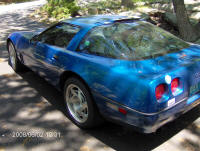 |
|
NP: |
TotD A Hewlett-Packard oldie but goodie. I think I picked this up at an "Interex" show back in the days when we made HP-compatible products. |
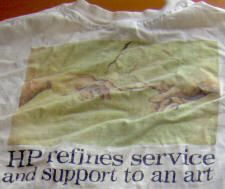 |
| © 2009 |
| Richard Factor |
